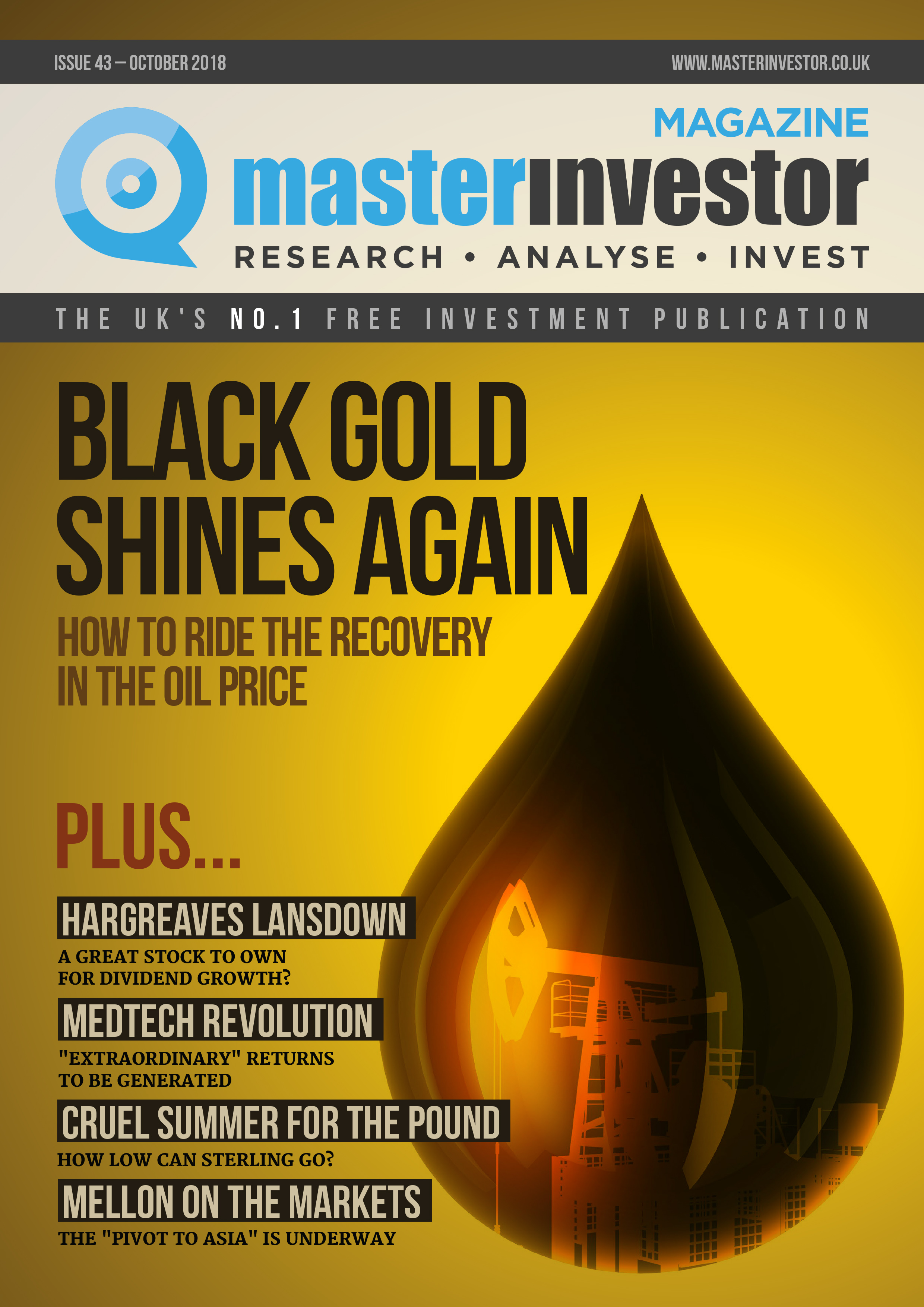This is just the beginning…

I don’t get any pleasure by uttering those immortal words ‘I told you so’, but that’s exactly how I’m going to begin this week’s article. That’s because last week we saw the FTSE 100 pull back dangerously close to the psychologically important 7,000 support line (representing a 10% fall since May’s peak) and I, like many others, have been warning about this impending crash for several months.
As soon as the market failed to break through the 8,000-barrier earlier this year and create a technical ‘triple top’ formation, the writing was on the wall.
The weird thing is why so many investors believe in exactly the same thing and expect a fall but yet fail to take any mitigative action. It’s the equivalent of knowing that it’s going to rain but walking out of the house without an umbrella. It doesn’t make any sense.
In fact, such is the importance of this topic that I wrote an article several months ago when I realised the end was nigh, entitled ‘Why everybody should have an umbrella even when it’s not raining’. (If you google it you may find it on the internet superhighway somewhere no doubt but if you struggle just email me my team at info@londonstonesecurities.co.uk and they will send you over a free copy.)
It makes for very interesting reading and the findings will absolutely shock you.
We are going down
So, the question on every investor’s lips is ‘what’s going to happen from here?’ Let me tell you, we are going down. That’s it. We may go up first, in fact we almost certainly will go up first, but the overall direction is going to be south. We may not even go down in a straight line but the direction of travel is down, not up. There’s no other easy way to break the bad news to you and I’m willing to go on record to say that. If I am wrong and the market goes up there’s no way that I can retract my comments so a lot is at stake by what I have just said. Or is it?

Never miss an issue of Master Investor Magazine – sign-up now for free! |
You see, like I say to my clients, ‘If I’m right I’m right, and if I’m wrong I’m still right’. That sounds pretty conceited but if I was your investment manager taking care of your portfolio I’m sure you wouldn’t see it that way. The point is this: What I’m doing for myself and for my clients is not a special strategy that I conjured up out of the school of Ranjeet Singh, an exclusive place of academic excellence whose doors are only open to people who share my name. Neither are the strategies that I implement so complex or expensive that it’s not suitable or appropriate to the average investor. That’s not true either.
The reason that I’m right even when I’m wrong is simply this. If I take out an insurance (aka a hedging policy) using say a put option, for example, which protects my client’s portfolio if the market falls and costs me a fixed sum of money, then my client can still benefit if the market goes up. Makes sense, right? It’s a fixed cost to protect against the downside but you still get to enjoy all of the potential upside (in case the market goes up).
And why wouldn’t insurance make sense? After all you would never question somebody taking out insurance on their car, their home or their life, right? So, does it not therefore stand to reason that a share portfolio also deserves the same level of protection?
Yes of course it does and so the only reason as to why more investors don’t take out insurance can only be either 1) they have no idea that they can or 2) they just don’t know how to. And if you need convincing that the market is heading for a serious fall in the next 12-18 months, then please don’t take my word for it. There are far more intelligent and acclaimed research analysts who make a very good living from crunching market data who will happily share with you the information that I already know.
The writing is on the wall
Take for example the fact that global interest rates are now beginning to creep up again. Remember that one of the major drivers for share price growth over the past decade has been the incredibly low interest rates which has forced investors to find an alternative home for their cash. This has meant a mass Serengeti-type migration of funds from cash into equities.
With other asset classes like property now losing steam and with rising bond yields due to concern of higher interest rate moves, investors are now more likely to start pulling their money out of equities and back into cash. And with investors worried about the impact of Brexit because it is still an unknown quantity, this is a perfect excuse to do so and de-risk their portfolios.
Or maybe it is the fact that whilst interest rates have been so low, many poorer countries, specifically emerging market economies, have been reckless in their ambition for growth. Whilst the economic powerhouses like the US and the UK have been otherwise pre-occupied patting themselves on the back for the incredible stock market recovery (which of course they played no part in), they have not cared to notice that there has been a dangerous spending epidemic going on in other parts of the world. Countries that could ill-afford to make repayments have actively borrowed money on the hope and a prayer that somehow by doing so it will kick start their failing economies and this will in turn enable them to pay off their newly acquired debt. Unfortunately for us, that bet hasn’t paid off and the debt collectors want their money.
This in turn has caused currency valuations to spiral out of control. Take the Turkish lira, for example, which has fallen by 50% against the US dollar this year. Or the Indian rupee, which has dropped 15%. The irony of course is that a falling currency means a rising equity market and so Mumbai’s Sensex index as a result has gone through the roof. This just exacerbates the problem because it gives a false impression that things are better than what they are – this isn’t true – rising equity prices due to a collapse in currency is not a good thing.
The same phenomenon is now hitting the Brazilian Real, the Russian Rouble and many more. And lest we forget the economic nightmare now ensuing in Venezuela?

Never miss an issue of Master Investor Magazine – sign-up now for free! |
Now let’s turn to our friends in China and the trade war ensuing with the US – a trade-war that shows no signs of abating any time soon.
What about Italy and the fact that I have been long predicting that this will be the next casualty of Europe and will be responsible for bringing the euro unceremoniously down with it? Does anybody believe me now?
And how about dividend yields? Did you know that the FTSE 350 low-yield index relative to the high-yield index, is the highest it has been for nearly 20 years? This means that there is every chance that prices are now over-valued and we could expect an imminent correction to bring yields back to more sensible levels.
Or what about the fact that it has been now 10 years since the last major crash and we are therefore in one of the longest stock market bull runs ever witnessed? Surely a correction is now long overdue don’t you think?
Perhaps it’s the fact that the central banks around the world have exhausted their free money bonanza give-away otherwise known as Quantitative Easing? The easy money is gone.
It could even be the ridiculous Price-Earnings valuations that have become common place in the US Technology companies across the likes of Facebook, Amazon, Google and co, which is chillingly reminiscent of what happened just before the dotcom crash in 2000.
You can’t stop the tide from coming in
It is probably a collection of all of the aforementioned factors, plus many more that I haven’t even considered, which will be responsible for bringing the stock market to its knees. When that will happen I can’t say, nobody can – but it will happen, of that I am sure.
And just to be clear, before I sign off on this cheery note, I do NOT want to see a market crash. I am not a Satanist and I absolutely do not take any pleasure in watching billions of pounds get wiped off the stock market, less still private investors lose significant chunks of their hard-earned pensions or ISAs.
But I am a realist and I do know that there is nothing that any person, organisation or government can do to stop the market from doing what it needs to do. Nothing at all. The stock market is like any other market, it moves in cycles, ups and downs. We all enjoyed the up and so buckle up and strap yourselves in because we are about to go down.
The fact is that you can’t stop the market falling any more than you can stop the skies from raining. What you can do however is that you can prepare and at the very least I hope that this article will make you think – to think not about the terror of what might happen during the next crash but how to mitigate that terror – because you absolutely can.
And even if you don’t believe in a word that I am saying and you still believe the market will be strong forever (barman give me a little something of what he’s drinking) at least go out and buy yourself an umbrella just in case you’re wrong.
Ranjeet Singh
www.londonstonesecurities.co.uk
In my opinion Ranjeet Singh is a fraudster and this is advertising copy for fresh victims. I have already made a regulatory complaint against LSS and I am truly disturbed that Master Investor has accepted ‘the shilling’ from this man
All this doom and gloom, and not a single practical suggestion on what to do, beyond taking out a put option – on what, exactly? This piece is basically just an advertorial with the implied message: come and subscribe to London Stone Securities. Should Master Investor really be promoting this stuff?
Can we have a simple (OK, all MI articles are thus) article on how to buy a Put Option, when to sell (or is it just like a share) and which one to buy (is FT-AS a catch all?; go for 3 months or longer?).
Société Genéralé offer a range of Put Warrants (see: https://sglistedproducts.co.uk/?uId=MLP-UNITED_KINGDOM-FTSE&uName=FTSE%20100) linked to either a given index or specific shares. The former will generally be the choice where a general market downturn is envisaged – there are FTSE100 linked Puts which are my favs.
For any given underlying, durations are typically 3/6/9/12 months with various strike prices. The Soc Gen guide as to which of these to purchase is helpful.
Selection of your range of Puts is possibly the easy part, knowing when to sell them is the art.
This isn’t investment advice, just information for those wishing to direct their own strategy.
Seems like a pretty good service they provide, this London Stone. Been checking them out and have seen no regulatory complaints on record, no blemishes at all. Thinking of dipping my toe in.